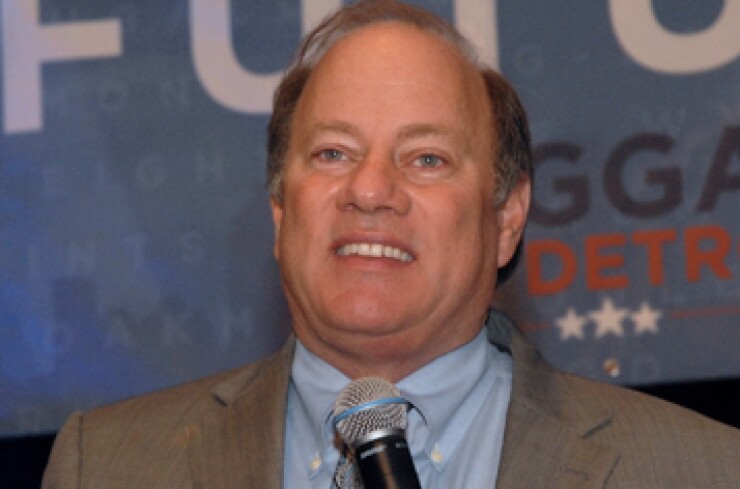
CHICAGO — Holders of $5.2 billion of Detroit water and sewer bonds will have a say in whether a new regional authority will take over the long-troubled Detroit Water and Sewerage Department.
The regional deal calls for Detroit to lease its massive water and sewer system to three neighboring counties for 40 years. The city in return will get $50 million in annual lease payments.
The Great Lakes Water Authority's board signed the lease on June 12 in a 5-1 vote.
The regional deal was one of the last big bargains struck during the city's Chapter 9 case. Detroit restructuring advisors began pushing for the new regional authority even before the city filed for bankruptcy in July 2013, but it proved to be one of the most contentious aspects of the bankruptcy.
Despite Friday's formal lease signing, the final deal still won't be done for up to six months. Roughly 10 issues remain outstanding, according to Robert Daddow, chair of the GLWA board and deputy executive of Oakland County.
Among them is the need to win the consent of at least some of the bondholders that hold $5.2 billion of Detroit water and sewer debt.
As the city pushed to exit bankruptcy, it launched a tender offer for the bonds. The tender offer was devised as an alternative to the city's proposal to impair the bonds by up to 50% by either stripping out call protections or replacing the current coupons with lower rates.
In response, bondholders tendered a total of $1.5 billion of bonds, representing 28% of outstanding debt.
The tender and subsequent refinancing documents included language that allowed the issuer to transfer the bonds to a new regional authority when and if it was created.
But consent is still needed from those bondholders who did not tender their bonds.
Daddow declined to name a specific threshold level, citing a gag order that federal Bankruptcy Judge Sean Cox put on the water authority talks.
"[Tender bond documents] did have the language there to allow for the transfer for those bonds tendered, but it fell short of the requirement that you would need to be able to do that today, so they need to secure additional bondholder consent," said Daddow.
It's one of several "conditions precedent" that the authority needs to accomplish before the deal is finalized, he said.
The deadline to finalize the issues is Dec. 31, 2015.
"With respect to roughly 10 conditions, it might take up to six months to do it and that becomes another hard deadline," he said.
The authority also needs to finalize a new master bond ordinance and meet with ratings agencies, among other things, he added.
The new authority aims for ratings higher than those of the junk-rated Detroit water and sewer operation.
That will be achieved largely through operational restructuring, said Daddow.
"I suspect that longer term, when the authority has had the ability to operate this thing for a longer time and in an open and transparent way, I think the region collaboratively can operate it better than what DWSD has done," he said. "I can assure you my style here is I'm going to be pressing as fast and hard as possible to accomplish those restructuring possibilities."
Detroit Mayor Mike Duggan has said in the past he hopes the authority will issue up to $800 million in new debt to allow the city to upgrade parts of its 6,000 miles of pipes. The bonds would be payable from the city's $50 million annual lease payments.
Prior to the recent settlement, Oakland and Macomb counties said repeatedly that they are worried about how the new authority will deal with outstanding unpaid bills. Highland Park, for example, a small city surrounded entirely by Detroit, owes DWSD $25 million in unpaid bills. The two parties are in federal court now over the matter.
Daddow denied that unpaid bills were a major obstacle in recent mediation talks.
"It was never a sticking point. It was a problem that I wanted solved and I wanted it solved no less differently than when DWSD operated it and I want it solved by DWSD today," he said. "But if it's not solved, the issue here is that we have no more tools to make people pay that don't have the wherewithal than DWSD does today."
The Macomb County representative on the board, Brian Baker, was the sole vote against the deal Friday morning.
Macomb officials complained that they were shut out of mediation and that the suburbs would be forced to take on too much debt. Baker also said the pension costs of the DWSD remain unclear and that Detroit, with two of the six board seats, has too much power.
"We have one chance to get this right," Baker said at the meeting, according to local reports. "We still have ... major concerns."
Duggan hailed the authority as a model of cooperation among the often-antagonistic communities.
"This is a historic step forward in resolving decades of conflict between Detroit and our suburban neighbors," Duggan said in a statement.
The new authority will be run by a six-member board made up of two Detroit mayoral appointees, one appointee from each county, and one appointee of the governor. Major decisions on issues like contracts or future privatization will require five out of six votes.





